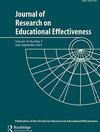观察有效性研究的协变量平衡:匹配和加权的比较
IF 1.6
4区 教育学
Q2 EDUCATION & EDUCATIONAL RESEARCH
Journal of Research on Educational Effectiveness
Pub Date : 2022-09-07
DOI:10.1080/19345747.2022.2110545
引用次数: 0
摘要
摘要观察有效性研究中经常使用倾向性评分匹配和加权方法,以减少治疗组和未治疗组在一组潜在混杂因素上的不平衡。然而,之前关于匹配和加权的许多方法论文献尚未检验大多数治疗单位的情况下的性能,这在广泛传播或“扩大规模”的计划和干预措施中经常遇到,我们比较了k∶1匹配与替换和加权方法在协变量平衡、偏差和均方误差方面的性能。结果表明,所有方法的准确性都随着治疗流行率的增加而下降。虽然加权产生了协变不平衡的最大减少,但与置换的1:1匹配提供了最无偏的治疗效果估计。提供了一个使用实证学校级数据的应用示例,以进一步说明这些方法在现实世界扩大工作中的应用和解释。最后,我们考虑了倾向评分方法对观察有效性研究的影响,特别关注教育研究。本文章由计算机程序翻译,如有差异,请以英文原文为准。
Covariate Balance for Observational Effectiveness Studies: A Comparison of Matching and Weighting
Abstract Propensity score matching and weighting methods are often used in observational effectiveness studies to reduce imbalance between treated and untreated groups on a set of potential confounders. However, much of the prior methodological literature on matching and weighting has yet to examine performance for scenarios with a majority of treated units, as is often encountered with programs and interventions that have been widely disseminated or “scaled-up.” Using a series of Monte Carlo simulations, we compare the performance of k:1 matching with replacement and weighting methods with respect to covariate balance, bias, and mean squared error. Results indicate that the accuracy of all methods declined as treatment prevalence increased. While weighting produced the largest reduction in covariate imbalance, 1:1 matching with replacement provided the most unbiased treatment effect estimates. An applied example using empirical school-level data is provided to further illustrate the application and interpretation of these methods to a real-world scale-up effort. We conclude by considering the implications of propensity score methods for observational effectiveness studies with a particular focus on educational research.
求助全文
通过发布文献求助,成功后即可免费获取论文全文。
去求助
来源期刊

Journal of Research on Educational Effectiveness
EDUCATION & EDUCATIONAL RESEARCH-
CiteScore
4.00
自引率
11.10%
发文量
37
期刊介绍:
As the flagship publication for the Society for Research on Educational Effectiveness, the Journal of Research on Educational Effectiveness (JREE) publishes original articles from the multidisciplinary community of researchers who are committed to applying principles of scientific inquiry to the study of educational problems. Articles published in JREE should advance our knowledge of factors important for educational success and/or improve our ability to conduct further disciplined studies of pressing educational problems. JREE welcomes manuscripts that fit into one of the following categories: (1) intervention, evaluation, and policy studies; (2) theory, contexts, and mechanisms; and (3) methodological studies. The first category includes studies that focus on process and implementation and seek to demonstrate causal claims in educational research. The second category includes meta-analyses and syntheses, descriptive studies that illuminate educational conditions and contexts, and studies that rigorously investigate education processes and mechanism. The third category includes studies that advance our understanding of theoretical and technical features of measurement and research design and describe advances in data analysis and data modeling. To establish a stronger connection between scientific evidence and educational practice, studies submitted to JREE should focus on pressing problems found in classrooms and schools. Studies that help advance our understanding and demonstrate effectiveness related to challenges in reading, mathematics education, and science education are especially welcome as are studies related to cognitive functions, social processes, organizational factors, and cultural features that mediate and/or moderate critical educational outcomes. On occasion, invited responses to JREE articles and rejoinders to those responses will be included in an issue.
 求助内容:
求助内容: 应助结果提醒方式:
应助结果提醒方式:


